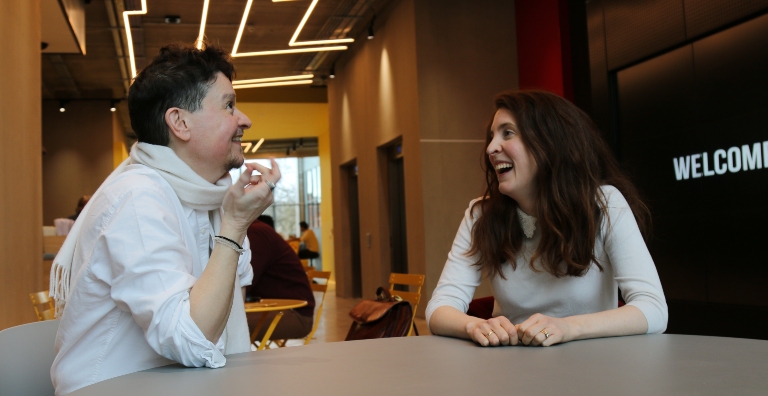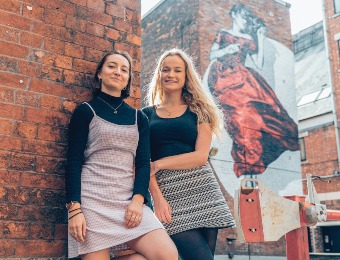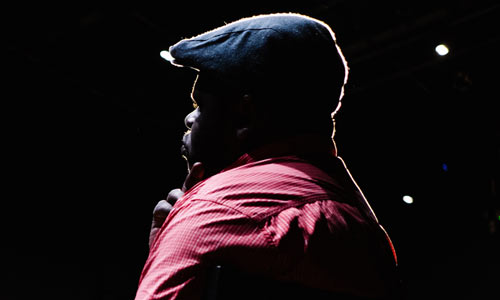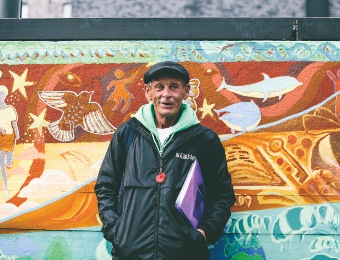Just over 30 years ago, the United Nations launched its Convention on the Rights of the Child. But today, children around the world continue to be denied their rights. Intersex children are at risk, with UN bodies issuing 40 reprimands in the past ten years. Working together, a Manchester academic and an activist hope to help these children get a better start.
Dr Fae Garland, Lecturer in Law in The University of Manchester’s Faculty of Humanities, has spent the past five years researching the lack of legal protection for intersex people across the world.
When she started working with people like Valentino Vecchietti, a multi-award winning intersex activist, journalist and consultant, she felt she was really beginning to make a difference.
“A lot of what I do has been informed by my engagement with you and other activists,” she tells Valentino. “How we can work together to inform, engage and empower a much bigger movement, rather than just doing law for law’s sake.”
Together, Fae and Valentino are tackling the persistence of non-essential and non-consensual medical interventions on intersex children and people.
Heart of the problem
The term ‘intersex’ covers more than 40 variations in a person’s physical sex characteristics. These variations may relate to a person’s internal or external genitalia, chromosomes and/or hormones. Approximately 1.7% of the global population is intersex, and up to 1.1 million people in the UK alone. Being intersex is as common as being a twin.
Medical practitioners refer to intersex variations as ‘disorders of sex development’. This pathological language is, argues Valentino, at the heart of the problem.
“If you contextualise something as a syndrome or condition it necessarily seems that it must be fixed. We are not talking about things that by and large need fixing.”
According to the European Bioethics Committee only three of the over 40 variations in sex characteristics require medical intervention for the sake of a person’s mental and physical health. Despite this, it remains extremely common for intersex people to be operated on or given hormonal treatments to make them physically ‘male’ or ‘female’.

Valentino Vecchietti and Dr Fae Garland (picture taken on campus prior to the COVID-19 pandemic)
Long-term impact
These interventions often start at a very young age and can continue throughout a person’s life.
“A lot of the guidelines that are relied on by the medical profession really encourage interventions to occur before the child reaches 12 months old.” Fae explains. “There is a lot of research coming out showing the harmful effects of these sorts of interventions, not just in the moment but lifelong. This can be scarring, pain, infection and sterilization.”
Fae speaks passionately about the socioeconomic consequences of repeated medical interventions. “If you’re having surgery throughout childhood your attendance at school won’t be as good as the peers around you, so it means you are missing out on large segments of your education. That has really obvious effects in term of employment opportunities and the way you are able to participate in society.”
If you’re having surgery throughout childhood your attendance at school won’t be as good as the peers around you, so it means you are missing out on large segments of your education.
Non-essential medical interventions on intersex people have been repeatedly condemned by UN bodies, including the Committee on the Rights of the Child and the Committee against Torture. In the past decade, 40 reprimands have been issued against over 20 nation states, yet only Malta has taken steps to put legislation in place to prevent unnecessary and non-consensual interventions.
Together with Dr Mitchell Travis at the University of Leeds, Fae has carried out empirical research with intersex activists and campaigners in the UK to understand the ways that the law should act to protect the intersex community.
“We basically found that the law was failing to do anything,” she says. “A lot of what we have done has been educating policymakers about this legal silence and that it condones medical interventions on individuals. Silence isn’t neutral but actually enables such practices to happen.”
Collaboration
For Fae and Valentino, collaboration between academia and activism is crucial to making positive change. Fae talks openly about how engaging with activists when she began researching in this area helped her to understand the real issues at stake.
“When I first got into this area, Dr Travis and I developed a research project that really mistook what the movement was about,” she explains. “It is only through speaking with individuals like Valentino that we began to change our research, and I think produce something that is much more helpful and informative.”
Valentino, in turn, has felt the benefit of working with academics.
“Your work really legitimises the work I do,” she tells Fae. “Your research gives me recourse to data and facts, so that when I go and talk to organisations about why we need inclusion and visibility I can talk about the law with knowledge and expertise. That wasn’t something I had recourse to before. I feel we are at the cutting edge of research and collaboration.”
I feel we are at the cutting edge of research and collaboration.
Although intersex people are currently not included in the UK’s Equalities Act, in the last few years there has been a shift in political awareness that has led to some positive steps forward. In 2017 the National LGBT Survey included questions about intersex experiences of healthcare for the first time.
Then, in 2019, both Fae and Valentino helped with a call for evidence led by the Government Equalities Office, which attempted to understand what steps the government should be taking on behalf of people with variations in sex characteristics and what the problems are with current medical practice.
The future
Valentino is keen to stress that these are only small steps in the right direction. There is much more work to be done by activists, campaigners, academics and policymakers to raise awareness and introduce legislation.
“The call for evidence is just a survey. It won’t lead to anything unless we make it lead to something. So the survey will be the data and we need to interrogate that data and work with it.”
Watching Fae and Valentino at work, you can’t help but be inspired by their determination. It is through their deep respect for each other’s skills and expertise that they are able to work so effectively together. As Valentino lays out their shared vision, it is clear that both academic and activist will keep striving for a fairer future for the intersex community.
“Ultimately we want to see a day where we will wake up and know that no child is going to be subject to non-consensual medical interventions; that no child is going to have to live with that burden.”
Valentino Vecchieti is the Founder and Dr Fae Garland a Trustee of the charity Intersex Equality Rights UK.
Listen to a podcast on Spotify, 'The Movement for Intersex Human Rights', recorded by Valentino and Dr Garland in 2019.
To learn more about the research, contact Dr Garland.
Find out more about our research into inequalities affecting children.





